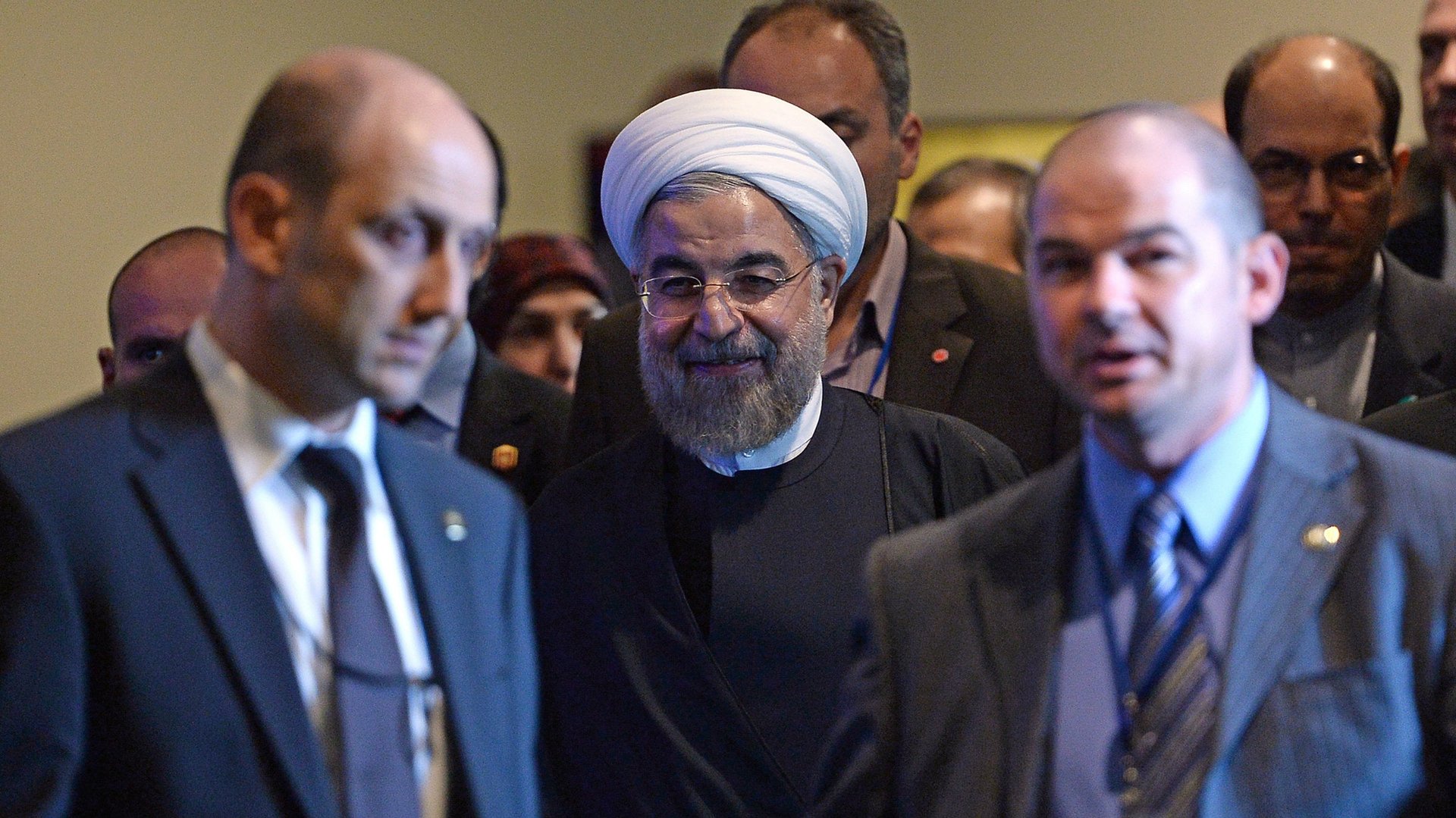Belle of last year’s UNGA ball, Iran’s Rouhani is overshadowed by enemies trampling in his backyard
As the US and its Arab allies launched a second round of airstrikes in Syria against the terrorist army known as ISIL, the reverberations could be felt halfway across the world, at the United Nations General Assembly. The strikes provided the soundtrack to the drama unfolding in New York, where US president Barack Obama worked to strengthen an international coalition against ISIL and made his case to the world in a sharply-worded speech.


As the US and its Arab allies launched a second round of airstrikes in Syria against the terrorist army known as ISIL, the reverberations could be felt halfway across the world, at the United Nations General Assembly. The strikes provided the soundtrack to the drama unfolding in New York, where US president Barack Obama worked to strengthen an international coalition against ISIL and made his case to the world in a sharply-worded speech.
For one high-profile delegation in New York, however, news of the latest attacks will have come as an unwelcome distraction. Iran’s leaders have traditionally hogged a great deal of attention at the UNGA; this time, president Hassan Rouhani has struggled to be heard.
Rouhani was the belle of the ball at UNGA 2013, winning plaudits for striking a tone of sweet reasonableness, in sharp contrast to the bellicose hectoring of his predecessor, Mahmoud Ahmadinejad. [UPDATED AT 11.51AM] But when he addressed the Assembly today, Iran’s leader had little progress to report.
It’s bad enough that nuclear talks between Tehran and Western powers have hit a roadblock, reducing the chances of further easing of economic sanctions. In his speech, Obama wagged a rhetorical finger at Iran, warning its leaders not to let the opportunity for a nuclear deal pass.
Just as significant, hopes that Rouhani would be an Iranian Gorbachev, introducing glasnost and perestroika to his long-oppressed people, have begun to fade. (His human-rights record was tarnished by reports about the plight of a British-Iranian woman who was jailed, apparently for watching a volleyball match.)
In interviews and public appearances leading up to his speech, Rouhani had his feet put to the fire for his government’s treatment of its own people. He was at a loss to explain the arbitrary arrest of the journalists Jason Rezaian and Yeganeh Salehi. He could not even promise to speed up their trial, displaying a powerlessness that undermines his claim that he has the authority to make a deal with the West and the ability to sell it to hardliners back home.
Rouhani was reduced to critiquing the Obama administration’s actions in Syria, a theme he continued into his speech to the Assembly. It was the West and its allies who spawned ISIL, he suggested, blithely ignoring his own country’s long history of supporting terrorist groups like Hezbollah and Hamas.
Iran’s alarm about the week’s developments in Syria and Iraq is not hard to understand. The US-led war against ISIL—also known as ISIS, or the Islamic State—represents both an opportunity and a challenge for Tehran’s Shia theocratic regime. On the one hand, any weakening of the Sunni terrorist group represents, at least in the short-term, a gain for Syria’s Shia dictator Bashar al-Assad, long Iran’s puppet. It also eases pressure on the Iraqi government, which is dominated by Iran’s proteges.
Those are the very outcomes Iran has sought for the past three years, as it had led the fight against the terrorists. In Syria, Tehran was represented by its reliable proxy, Lebanon’s Hezbollah militia; in Iraq, the ISIL threat was deemed so dire that Iran dispatched Qassem Soleimani, commander of the notorious Quds Force—an elite unit of the regime’s Revolutionary Guards—to help in the defense of Baghdad. Soleimani was accompanied by 70 men, the modern equivalent of the ‘Immortals’ of ancient Persia.
On the other hand, Iran now faces the disturbing prospect of Sunni-Arab nations, backed by the US, trampling on what Tehran considers its backyard. The fight against ISIL is being led by a coalition of countries that have traditionally been hostile to Tehran, and the Obama administration, having pressured the pro-Iranian Nouri al-Maliki to give up the prime ministership of Iraq, is leaning on his successor, Haider al-Abadi, to make concessions to Sunnis.
There was a hint of desperation in a statement the Revolutionary Guards, claiming that the commander of its elite unit—and not US airstrikes—had stopped ISIL at the gates of Erbil, capital of Iraqi Kurdistan, last month. “If Iran hadn’t helped, [ISIL] would have taken over Kurdistan,” Gen. Amir Ali Hajizadeh said in the statement. “Our great commander, General Soleimani, stopped the advance of [ISIL] with 70 people, and they were not able to enter Erbil.”
Rouhani indulged in some self-congratulation himself, touting Iran as an island of stability in stormy waters. But try as he might, he could not paper over the paranoid repression of his government.
Although he hasn’t been the center of attention this time around, Rouhani’s dance card in New York was hardly blank. He did get to meet with David Cameron, the British prime minister, and with French president Francois Hollande. But there was no direct meeting with the American president, and the Iranians didn’t get the photo-op they craved most: an Obama-Rouhani handshake on the floor of the General Assembly.
Ah, well. There’s always next year’s ball.